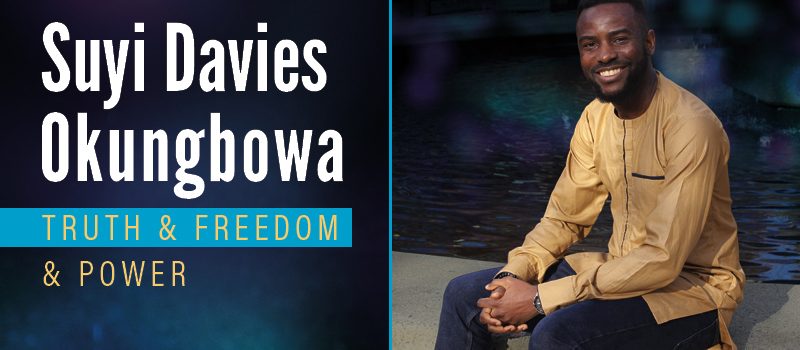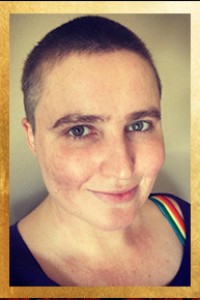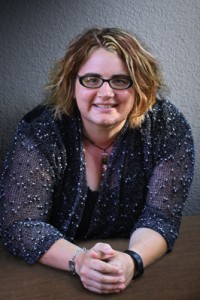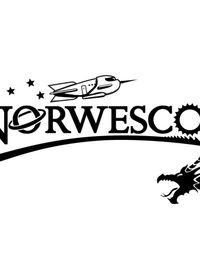Suyi Davies Okungbowa: Truth & Freedom & Power
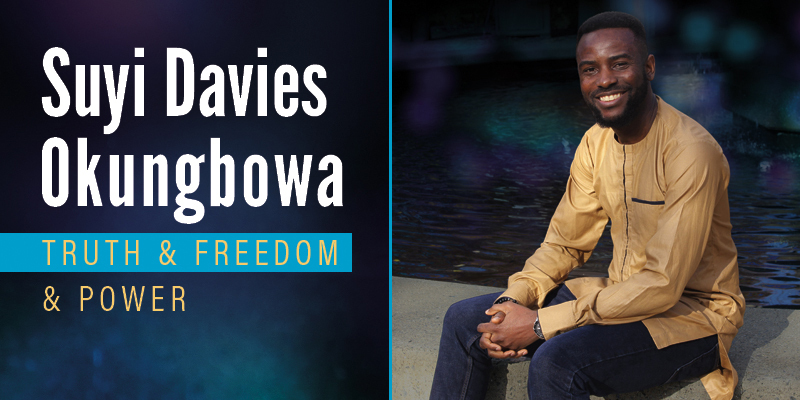
OSASUYI OKUNGBOWA, who writes as Suyi Davies Okungbowa, was born August 27, 1989 and grew up in Benin City, Edo, Nigeria. He earned a degree in civil engineering at the University of Benin. He earned an MFA in creative writing at the University of Arizona, and now teaches creative writing at the University of Ottawa in Ontario, Canada.
He began publishing SF with story “Breaking the Habit” (as Suyi Davies) in 2015, and has since published over a dozen pieces in anthologies and magazines, including The Dark and Tor.com. Story “Dune Song” (2019) was a finalist for the Ignyte Award, as was essay “The African Superhero and the Legacy of Captain Africa” (2020).
His debut novel, David Mogo, Godhunter (2019) won the Nommo Award for Best Speculative Novel by an African. Son of the Storm (2021) is first in the Nameless Republic trilogy, with second volume Warrior of the Wind forthcoming November this year. He has also written tie-in works for Stranger Things and Minecraft as Suyi Davies.
Excerpt from the interview:
“There are four authors at the time who were my major inspirations in science fiction and fantasy. I say ‘at the time’ because I had a lot of other storytelling influences growing up, from oral indigenous storytelling to Nigerian cinema to imported English children’s authors to African authors I read in my teens. But these four – they were my gateway into modern speculative fiction as we interpret it. I wouldn’t say my work or style really looks like theirs now, but reading them back then taught me certain different things. The first was Stephen King. In Nigeria back then, in many cities, it wasn’t easy to get print books of foreign authors, and ebooks weren’t a thing yet. So we often got used books, spread out on the floor by vendors in crowded markets, and we’d jostle to pick up worn mass market paperbacks by the most popular authors, often American or British. And a lot of them were Stephen King novels. I started there – this was even before I started writing, myself – and that pushed me in the fantasy direction, mostly of a darker kind. I was reading a bunch of other stuff like crime and realist work, but I was particularly fascinated by how you could weave this otherworldly stuff into a world that felt real. When I finally had some access and a little disposable income and started thinking about reading others, the two authors I most connected with at the time were Nnedi Okorafor and Neil Gaiman. Nnedi Okorafor, specifically, because, at the time – again, in 2012 – there weren’t a lot of stories that were science fiction or fantasy but that centered African characters, especially those like me, living on the continent. So to find a Nigerian- American who was writing about Nigerian characters with some stories set in Nigeria – the first book of Okorafor’s I read was Akata Witch, but it wasn’t named Akata Witch in Nigeria because they changed the title. It was called What Sunny Saw in the Flames – the original title wouldn’t have flown. I was very fascinated by that book: ‘Wow, this can be done.’ What struck me about Neil Gaiman’s work at the time, as I read a bunch of his short stories and a few novels, was the way he used language to evoke certain kinds of tones, moods, what we now come to think of as ‘vibes.’ That was something I used to think was more common in literary fiction, or mainstream work, but here I was, seeing it being employed in fantastic work. It blew my mind, and opened me up to the understanding that those two are not as mutually exclusive as I’d been led to believe. The last big influence was Octavia E. Butler, who I came to in about 2013. Lots of people say she was prescient now, but that wasn’t quite how people viewed her back then. But I always thought there was something special about the woman. I felt she was always seeing things you could only see when you tilt the world and look at it askance, something most of us, even us writers, are kind of afraid to do, or to do too much of. She did it without fear, consequences be damned. Each time I read something of hers, I’d think, ‘That is so wild and insane, but makes complete sense.’ These four authors – their fiction became the catalysts that set me on the road to shaping how I think about my work now, even if it’s not obvious in my style or the stories themselves. They gave me a baseline when I started to think about why I wanted to tell stories in this same field – they were doing all the things I wanted to do, and I saw them do it, so that meant I could do it too. Of course, my writing itself has influences far beyond those four, but at that time, they had a strong impact.
“Literature isn’t the only influence on my storytelling, as I said before. Nigeria has a very strong and long oratory as well as cinematic history, and a lot of my understanding and thoughts about storytelling came from there. And then, of course, there’s also Hollywood and foreign visual media, which I consumed a lot growing up – and still do. I read a lot as a child, but it was not always work that centered people like me – so in the beginning, a lot of my writing was mimicking other stuff I saw out there, including people and concerns outside of my own world. A lot of my stories seemed, at the time, like they had influences from influences close to home – the plot beats and dramatizations of Nigerian cinema, or the oratory voice of a gossiper – enmeshed in what I learned by reading American or English authors – I was trying to marry those two things. It was not necessarily the best execution, because I hadn’t spent significant time with the craft. My idea of bringing seemingly disparate styles of storytelling together is still kind of the same, though. What has changed over time is the practice of the craft, but also an understanding that craft is not just a series of lessons. Craft is identity-rooted, and it is power-rooted. It has roots in a lot of things beyond, ‘This is how to tell good stories.’ What ‘good’ stories consist of, who gets to decide what makes a story good… all of that stuff matters. I have a much stronger hold on those factors now than I did in the beginning, or even when I made my first sales. At the core has always been these disparate influences that ordinarily you wouldn’t find in the average mainstream work of fiction, although that is starting to change, in 2022. I’m talking about ten years ago – that’s a long time.
“There has been a through-line to the evolution of my work, marrying these various influences, but also growing my craft. I also came to terms with not necessarily feeling like I needed to be in a box. One of the things I struggled with very early on was thinking I could only tell certain kinds of stories. There were only certain kinds of stories that were accepted from Africans, in the West. I looked around at the African authors who my fellow readers liked, and I believed, ‘I can only write this if I want to be taken seriously.’ But then I came to understand that there are forces behind all of these things, and I do not have to play the game if I don’t want to. I could write the things I wanted, use my voice in the way I wanted, while still writing in the genre. At the time, there wasn’t a lot of epic fantasy centering African characters that you’d see in mainstream publications, global houses, and the Big Five publishers. I didn’t think that those could be done, but now, I think, ‘Absolutely.’ I also thought that my writing had to be one thing or the other – they had to either be totally serious and not borrow influences from films or the genre or other forms, but now I know I can blend whatever I need to to achieve whatever I want. Now I understand even more that I can step outside of the traditional boxes and do new things. I can cross over, and the most important thing is that I have a handle on what I’m doing. That’s actually my aim as an author: I want to do many different things without being pigeonholed.
“I didn’t get that confidence as far back as you might think. It took a long time to gain it, not just because of the stories that the industry is telling you through what they’re publishing, but also because I’m still learning, craft-wise. Sometimes it’s hard to back yourself in that way because you know you’re still in progress. You have to get to a point – and this point often doesn’t come alone, it comes with community – where you meet other people who are feeling the same thing, going through the same motions, and you come together and start to realize that you’re thinking the same things and you have this power to push yourselves. It didn’t just happen that one day I woke up and said, ‘Eureka! I want to do this thing.’ It was through community. I was seeing people talking about the same ideas, making choices, and I thought, ‘If they can, I can, too.’
“I talk to my students about this a lot. You reach a point where you’re still getting feedback that says, ‘We want you to explain this cultural aspect mentioned here,’ but I’ve had discussions with a lot of people who feel that frustration, where they don’t want to explain parts of their culture. Then you get that confidence to push back and say, ‘No, my writing is actually good as is, and I’m not going to explain these things.’ Sometimes, when they ask you to explain, it suggests that your writing is not doing the work that it’s supposed to do because of their confusion, which is not quite correct. There is a tension between ‘How do I gain the confidence to back myself even knowing that there’s still space to learn, but knowing that this is a point where I need to push back at the narrative that’s being foisted upon me, or people like me?’ It does take a long time. It doesn’t even stop, per se – you just approach the criticism differently, or with more confidence, as time goes on. It’s not like it’s gone away now. I still say, ‘You have to leave that in; you can’t italicize that word; I’m not going to translate that word from an indigenous language, it’s just going to be that way’ – stuff like that.
“Both my books were not just different paths to publishing but different experiences. David Mogo was published by Abaddon, which is an imprint of Rebellion Publishing, an indie in the UK, but they have decent global reach. Son of the Storm was published by Orbit, which is an imprint of Hachette, which is one of the Big Five. The acquisition processes were very different. Son of the Storm went through an agent, and was pitched in a typical way, but David Mogo was purchased through an open submissions window, which happens once every green moon or something; it was just timing. I had a sample, Rebellion was looking for stuff, I sent it in, and months down the line they got back to me and said, ‘We like it.’
“The two books couldn’t be any more different, and not just in tone or approach or styles. What’s most different is how I thought about the people on the receiving end. I say ‘people on the receiving end’ because I’m not just talking about readers, I’m talking about editors, agents, reviewers, critics, etc. With David Mogo I was a green newbie who had simply been writing for fun, and I went all in, no holds barred, with limited knowledge of the industry or expectations. And in a way, sometimes, you want that for some kinds of stories. I don’t think I could’ve written David Mogo the way I did if I knew what I know about the industry now. I’m glad I didn’t. I’m glad it exists as is.
Interview design by Stephen H. Segal.
Read the full interview in the February 2022 issue of Locus.
 While you are here, please take a moment to support Locus with a one-time or recurring donation. We rely on reader donations to keep the magazine and site going, and would like to keep the site paywall free, but WE NEED YOUR FINANCIAL SUPPORT to continue quality coverage of the science fiction and fantasy field.
While you are here, please take a moment to support Locus with a one-time or recurring donation. We rely on reader donations to keep the magazine and site going, and would like to keep the site paywall free, but WE NEED YOUR FINANCIAL SUPPORT to continue quality coverage of the science fiction and fantasy field.
©Locus Magazine. Copyrighted material may not be republished without permission of LSFF.


